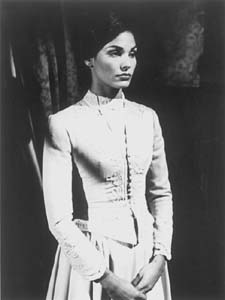Wedding Day
'Best Man' interrupts the big day
IN RURAL ITALY on New Year's Eve 1899, one of the last arranged marriages of the old century is about to take place in The Best Man. Francesca (Inés Sastre) is supposed to take a well-off but very unappetizing spouse. Edgardo (David Cantarelli) is a ringer for the young Hume Cronyn: same sharp nose, same beady eyes, same hissing, insinuating voice. Francesca's family is depending on the marriage. Her father is overextended and needs the money Edgardo will provide as a business partner. In terror of marrying this wealthy reprobate, Francesca prays for a deliverer. She fixes her hopes upon a man whose local fame all but upstages the bride--not that she minds, under the circumstances. Angelo (Diego Abantantuono) is an ex-bricklayer who emigrated to America and has just returned with a fortune. For every bad quality Edgardo has, Angelo the angel has two good ones. He's humble and chaste, whereas Edgardo is boastful and lecherous. For insufficiently explained reasons, Edgardo decides to bring this paragon into the wedding party as the best man.
A sort of fairy tale, The Best Man is a handsome diversion. Sastre, a Spanish actress, has the fierceness and casual gorgeousness that one expects from the female lead in Italian movies. An audience can feel for her as she refuses to submit to the awful Edgardo even at the last moment--walking away from the altar in midceremony. ("An attack of anxiety--too much joy," her mother explains to the guests.) The production design is handsome. The Tuscany look has about run its course. The Best Man is set in Emilia, in the north of Italy. It's damper, rougher, woodier country. And although most of the furnishings and clothes are reminiscent of Tuscan chic, the furnishings are more rustic and sparse--fewer of the inevitable terra-cotta colors and more olive greens and grays. There are quaint wedding rituals you've never heard of here too: a bathing of the bride's personal areas with "water of the saints," a concoction of herbs and flowers. And according to custom, a virgin has to be recruited to help the bride on with her stockings.
Director Pupi Avati plays with one of the audience's expectations. We think the drama to be resolved by midnight of the new century, but it isn't. Although the only possible ending does occur, the delay of the same seems frustrating, a little exasperating. Avati doesn't bring this small story to a point fast enough. The Best Man's soundtrack is by 73-year-old Riz Ortolani, the veteran composer who came up with the "Theme From Mondo Cane"; his status as grand old man is evident by the amount of volume Ortolani is allowed. Aside from the noisiness of the score, The Best Man is a pleasant, nostalgic movie. The film is most poignant in the way it shows a wedding party imagining the 20th century to come as a land of wonders. Who thinks of the 21st century thus?
[ San Jose | Metroactive Central | Archives ]
![]()
 Emilian Bride: Inés Sastre has doubts at the altar
Emilian Bride: Inés Sastre has doubts at the altar
The Best Man (Unrated; 100 min.), directed and written by Pupi Avati, photographed by Pasquale Rachini and starring Inés Sastre and David Cantarelli.
From the August 20-26, 1998 issue of Metro.
![[Metroactive Movies]](/movies/gifs/movies468.gif)